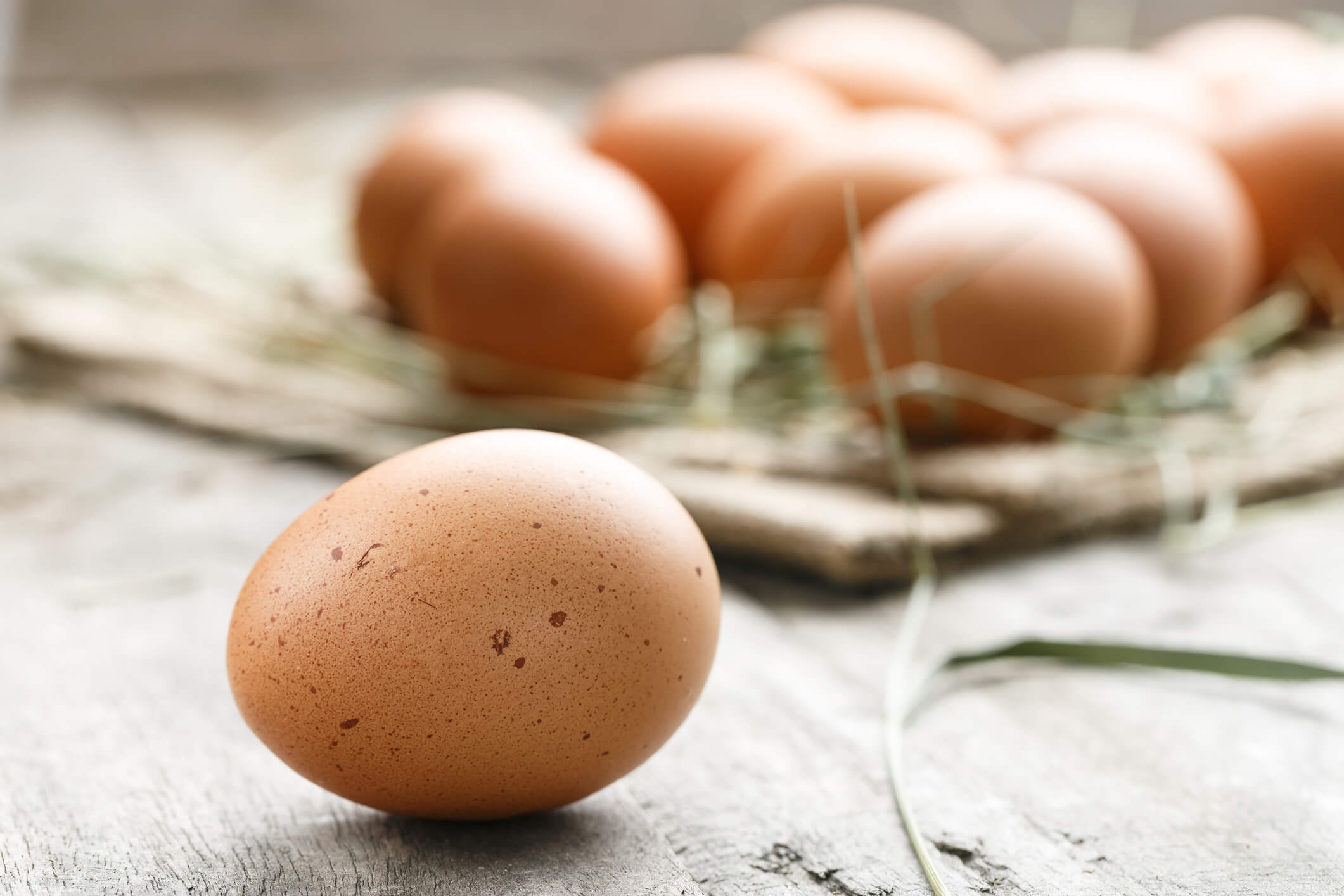In theory, eating eggs might not seem to raise ethical concerns.
Chickens that run around outside, peck in the dirt, eat weeds, slugs, snails, and compost, fertilize the soil with their manure, and aerate the earth with their claws and beaks could be a relatively nonviolent and healthy part of a sustainable farm.
And when farmers breed chickens to lay eggs, they will do so every day or two, at least for a few years, without the killing that’s an inherent part of meat consumption.
But life doesn’t exist in theory. And in the real world, the vast majority of our modern eggs come from animal factories that are nothing humans should feel terribly proud of. So are eggs healthy for you, animals, or the planet?
The Ethics of Eating Eggs (In the Real World)
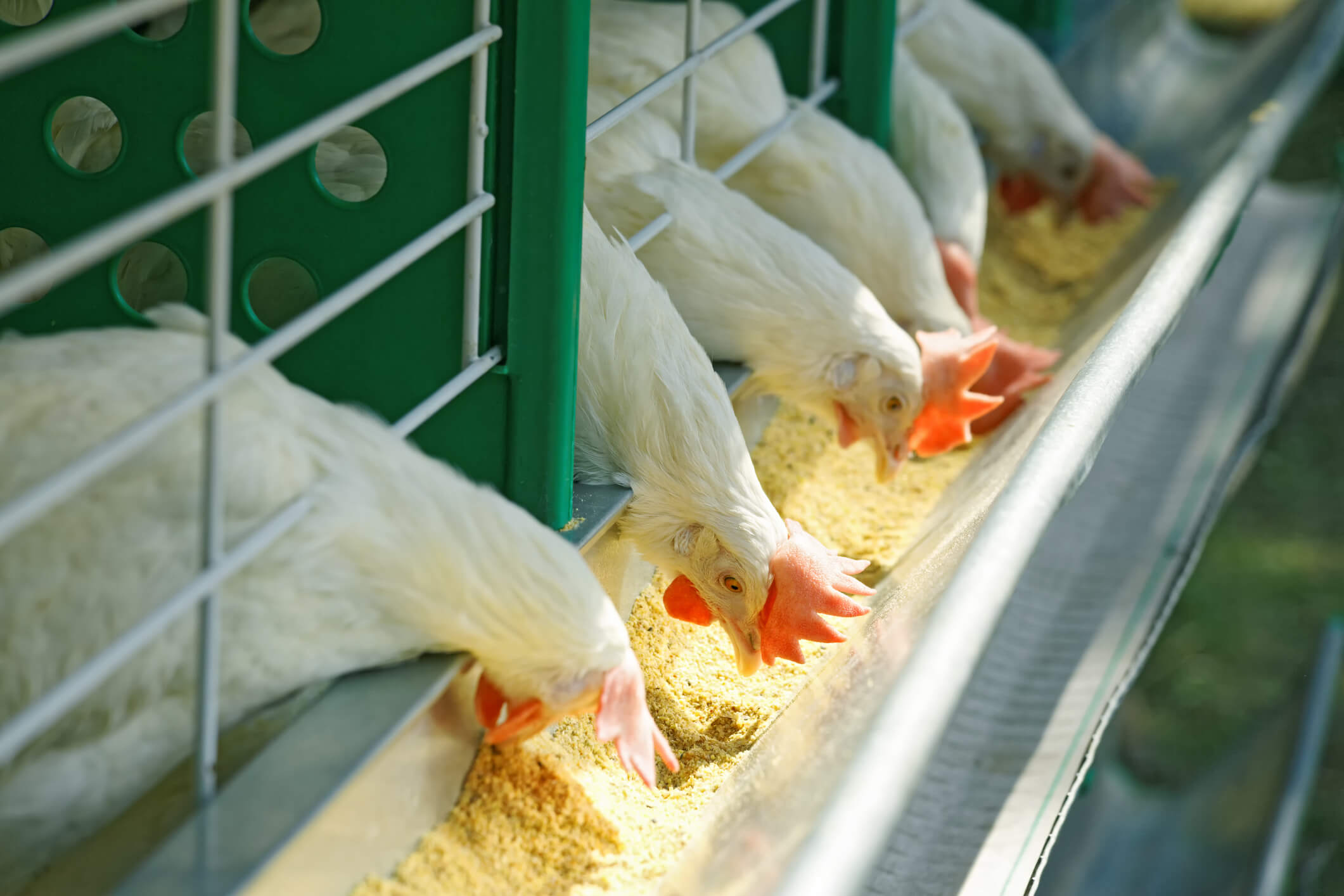
About 94% of the eggs produced commercially in the U.S. come from caged hens.
The average caged laying hen spends her entire life in an area smaller than a single sheet of paper. She is unable to lift a single wing or move more than a step or two.
Factory farms typically stack cages so that the feces and urine of the upper birds constantly fall on the heads of the ones below. To prevent hens from pecking and wounding each other in these conditions, egg producers will cut off their beaks with a hot blade.
Chickens often die in their cages, and are, sometimes, not even removed when they do. The birds who do survive only live to be around two years old (about a quarter of their natural lifespan). And then, they are killed due to their waning egg production.
This means that one hen is killed for about every 600 eggs. Because roosters do not lay eggs, the hatcheries kill all the male chicks right away. They often dispose of the chicks in horrific ways — like grinding them up alive.
What About Cage-Free, Free-Range, and Organic Eggs?
If, for ethical reasons, you don’t want to support the factory farms that use battery cages to house their hens, can you be reassured by the labels “cage-free,” “free-range,” and “organic?”
The short answer is no. These labels aren’t all they’re cracked up to be.
Organic eggs come from hens who are not given antibiotics. They also eat organically-grown feed that is free of GMOs and synthetic pesticides. But the organic certification tells you almost nothing about the actual conditions in which the birds live.
The “cage-free” and “free-range” labels mean that birds had at least a bit more space. But that doesn’t mean the farmers tucked them in at night and read them bedtime stories.
As I point out in 31-Day Food Revolution, labels on animal products can be misleading.
Cage-free birds typically have 1.5 square feet of space per bird, but the FDA doesn’t have clear-cut rules on the subject.
Free-range birds get at least two square feet, and must, technically, have access to the outdoors. But in practice, this often means that they have a door to a tiny outdoor patch of dirt. It also means birds still spend their entire lives cooped up in a giant barn with thousands of other birds.
Excretory ammonia typically chokes the air in cage-free, free-range, and organic operations alike. This affects the health of birds as well as humans.
And farmers can still confine “cage-free,” “free-range,” and “organic” birds with little or no access to the outdoors. They can still debeak them. And they can still live in such cramped conditions that they cannot spread their wings.
Can Ethical Eaters Trust Any Egg Labels?
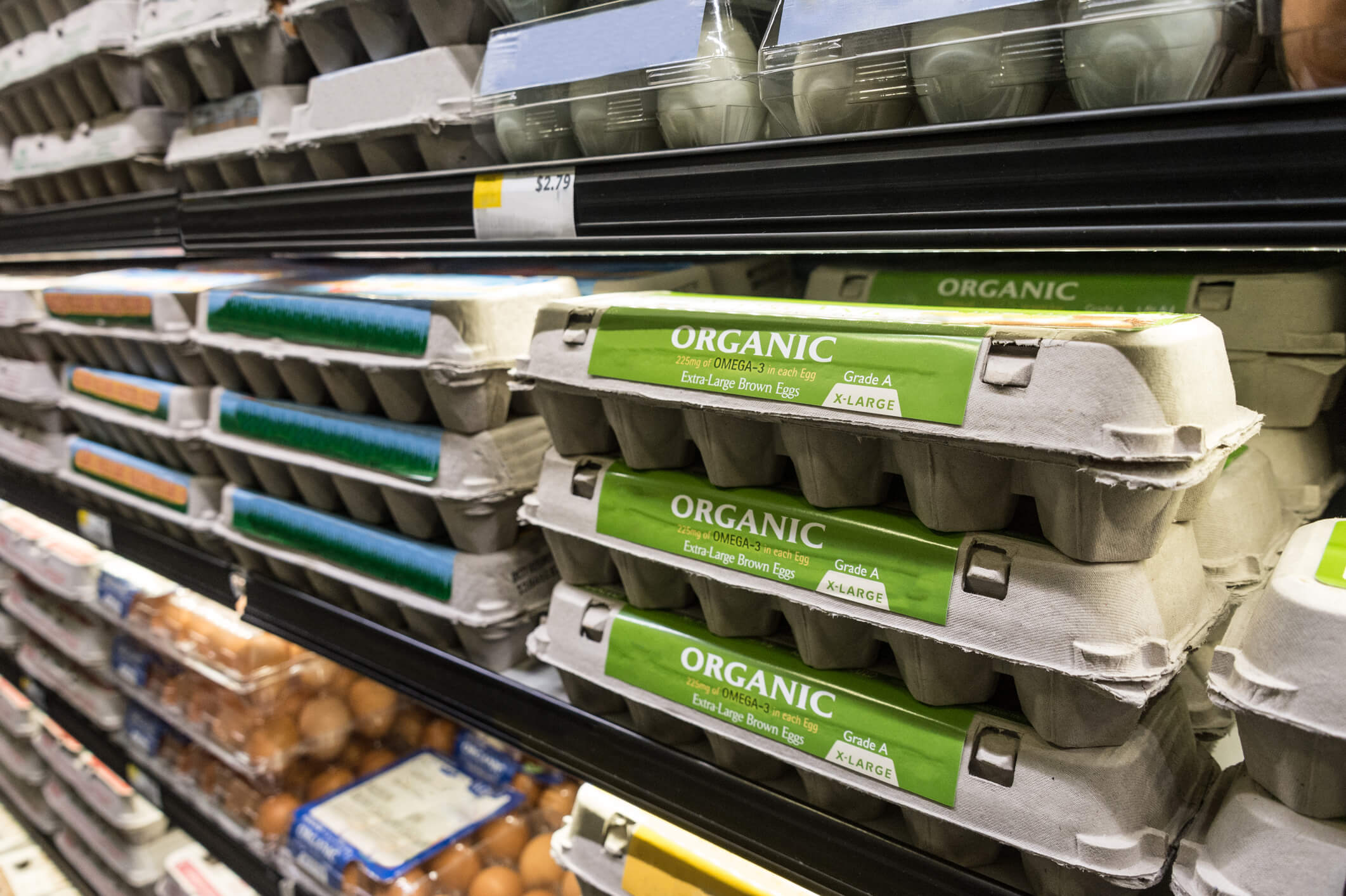
So do any labels have meaning? Are there any eggs that an ethically-minded egg-eater can trust?
Perhaps. The “pasture-raised” labels ensure that birds get at least 108 square feet per bird, though it isn’t necessarily monitored.
If the pasture-raised label is alongside the USDA Organic and Certified Humane labels or the Animal Welfare Approved label, you probably have a product that came from chickens who ran around, saw the sun, spread their wings, scratched in the dirt, and ate bugs.
Eggs and Environmental Sustainability
Americans eat about 279 eggs per person per year, which comes to 90 billion eggs, give or take an omelet or two.
It takes about 326 million egg-laying chickens to produce all those eggs. That’s in addition to the approximately nine billion broiler hens — chickens raised for meat — that are killed every year.
And while a few chickens running around can be beneficial in a backyard farm, industrialized operations are quite another matter.
The huge amount of chicken manure produced in factory farms that house up to 20,000 chickens in a warehouse is a problem that has no good solution.
The chicken manure often winds up as runoff into streams, lakes, and other bodies of water. All these compounds in water lead to algae blooms, often resulting in massive fish kills. Pathogenic microbes in chicken waste also cause disease in land animals.
Workers in chicken warehouses who inhale the dust of chicken poop are at risk for a serious lung infection called histoplasmosis. Their contact with chickens also puts them at risk for salmonella and campylobacter. These are the same bacterial diseases that consumers of chickens and eggs may contract.
In backyard farms, chickens might eat compost, snails, or slugs. But in industrial operations, their diet is based around grains and legumes.
Any time you move up the food chain by feeding livestock, you get waste. It takes about four pounds of chicken feed and 636 gallons of water to produce a dozen eggs.
In a resource-depleted world, it’s almost always more efficient to eat food directly than to cycle it through animals.
Are Eggs Healthy for Humans?

Ethical and sustainability considerations aside… purely from a health perspective, what’s the skinny on eggs?
Are eggs healthy, or dangerous, or somewhere in the middle?
Before we look at the research, let’s put one thing in perspective. It matters how an egg is produced. When chickens are pasture-raised, their eggs contain less saturated fat, and more vitamin A, omega-3s, and vitamin E than industrially-farmed eggs. Not to mention salmonella contamination is less likely.
Because almost all the eggs produced and consumed today come from animal factories, studies that have assessed the health impact of eating eggs were done on people who, for the most part, ate eggs that came from these conditions. Therefore, we don’t know how the study of pasture-raised egg-eaters might (or might not) yield different results. With that as context…
Egg Nutrition Facts
Whether raised in a pasture or in cages, chicken eggs are, essentially, potential chicken embryos. (This depends on if they’re fertilized and allowed to develop.) But they’re more than that because eggs also contain all the nutrients that the little possible bird-to-be (the yolk) would need to grow into a tiny chick.
Along with 187 mg of dietary cholesterol (a hotly debated substance that may not be as bad for you as was previously believed) and 1.6 grams of saturated fat, a typical hard-boiled egg contains a decent amount of folate, riboflavin, selenium, choline, vitamin B12, and fat-soluble vitamins A, D, E, and K, as well as lecithin. A hard-boiled egg also provides six grams of protein.
But you can obtain all the vitamins and minerals in eggs by eating plant foods — with a lot more fiber (there’s none in eggs) and without saturated fat. (The one exception is vitamin B12 — more about that here.)
Eggs and Eye Health
Egg yolks are also touted as sources of the carotenoids lutein and zeaxanthin. These antioxidants find a home in the retina of the eye. And they protect the eye from the harmful ultraviolet rays in sunlight and from age-related conditions, such as macular degeneration and cataracts.
One study showed an increase in blood levels of lutein by up to 50% and of zeaxanthin by up to 142% when participants ate 1.3 egg yolks per day.
However, eggs aren’t the only sources of lutein or zeaxanthin.
In fact, lutein and zeaxanthin are both found abundantly in a number of plant foods: squashes, peas, dark leafy greens, yellow corn, pumpkin, asparagus, carrots, broccoli, kiwi, grapes, and many more. And the reason eggs have lutein and zeaxanthin is that chickens eat plants.
Eggs and Protein
As for protein, there’s growing evidence that animal protein is inferior to plant protein and potentially carcinogenic.
Legumes (and other foods) are rich in protein without the drawbacks of animal protein, such as increased levels of cancer-promoting insulin-like growth factor 1 (IGF-1) in the bloodstream.
And many of us may actually be getting too much protein for optimal health. Excess protein consumption has been linked to a number of health conditions, including dehydration, nausea, cardiovascular disease, kidney disorders, cancer, and more.
Egg proteins also are the cause of common and sometimes severe egg allergies: the immune system reacts to those proteins and releases histamine, triggering allergic symptoms in some people.
Are Eggs Healthy for You? The USDA Says, “No”
Interestingly, the American Egg Board, a promotional entity funded by egg producers and administered by the USDA, spends 10 million dollars every year promoting egg consumption.
And yet, the USDA insists that any ads supported by the egg board conform to government regulations, which forbid false advertising.
Michael Greger, MD, used a Freedom of Information Action request to uncover that the USDA has specifically prohibited the Egg Board from describing eggs as “healthy,” “nutritious,” or “helpful with weight loss.” The USDA didn’t even allow the board to say that they “contribute nutritionally” or “contribute healthful components.”
Why? Because according to the USDA, those statements would be lies. What the USDA did finally allow the Egg Board to say, after much negotiation, was that eggs “reduce hunger.”
I don’t know about you, but I don’t find that to be an especially compelling health claim. I’d hope that a food would reduce hunger! And apparently, it’s about all that the Egg Board could come up with that met with USDA approval.
Eggs Have Some Serious Drawbacks
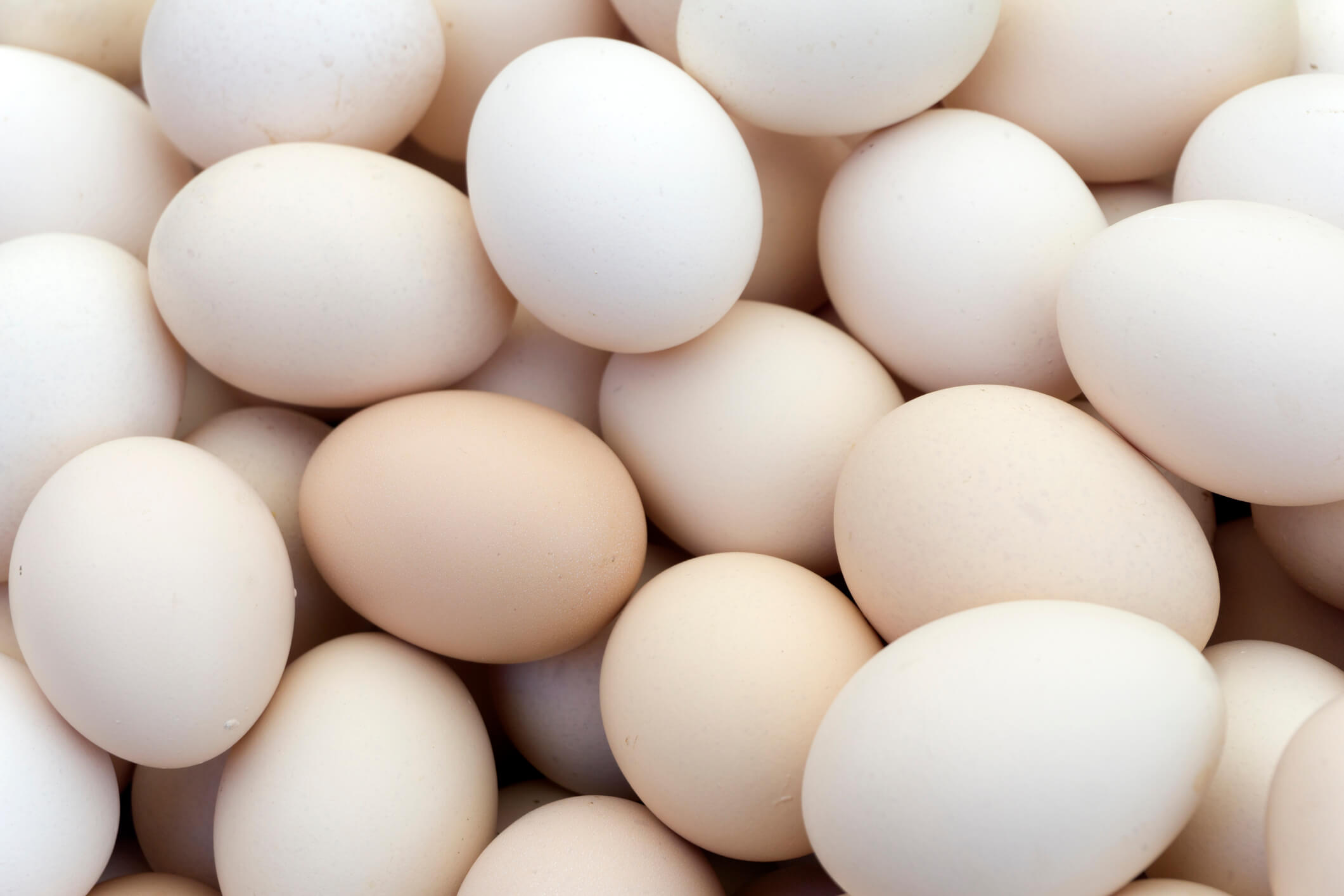
In March 2019, researchers from four universities published the results of a massive study in the JAMA medical journal.
The researchers had been following 29,615 U.S. adults for an average of 17.5 years. They found that those participants who ate an average of two eggs per day had a 27% increased risk of developing heart disease.
Renowned cardiologist Dr. Joel Kahn, a Food Revolution Summit speaker, points to multiple studies linking egg consumption not only to increased risk of coronary heart disease, congestive heart failure, and carotid artery disease — but also to prostate cancer, breast cancer, ovarian cancer, colon cancer, and last but not least, death.
And what about diabetes? Some health advocates point out that eggs contain no carbs and recommend them for people concerned about diabetes as a way to help balance blood sugar. But that advice may be ill-founded.
The Physicians’ Health Study tracked 21,327 participants over 20 years. It found that amongst those suffering from diabetes, those who ate the most eggs were twice as likely to die during the study, compared to those who ate the least.
And then, finally, there’s the fact that eggs bring a high risk of salmonella infection. In the year 2010, over 500 million eggs were recalled in the wake of salmonella outbreaks.
Egg-cellent Ways To Go Egg-Free
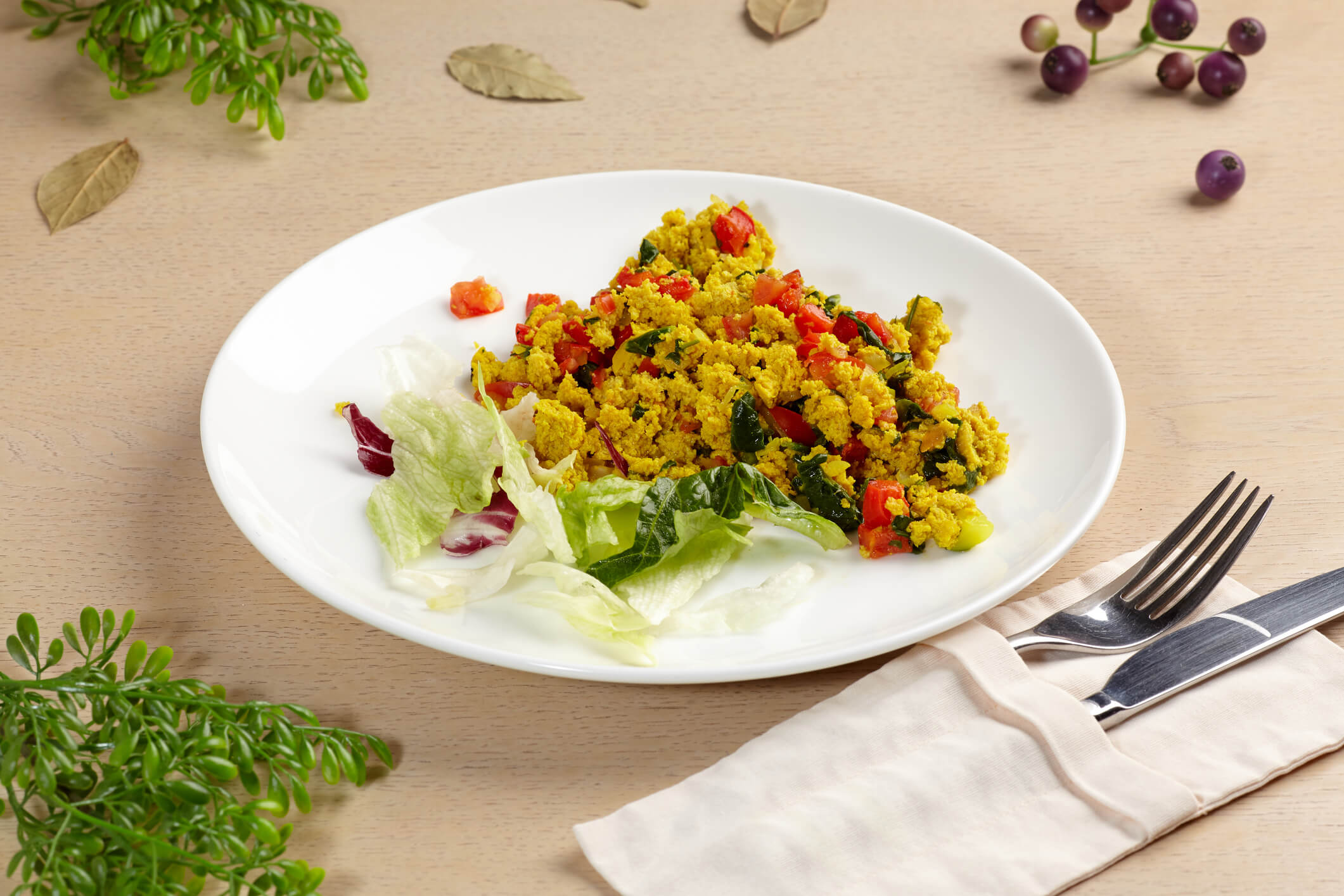
If you want to reduce your egg consumption, but you’re concerned about how doing so might impact your culinary life, here are a couple tips that might help you:
- Try a liquid egg replacer. If you’re looking for an easy way to recreate scrambled eggs (and you don’t mind incorporating some refined foods), JUST Egg offers a plant-based liquid egg replacer. Made from mung-bean protein, those who have tried it say it’s hard to tell the difference between scrambled JUST Eggs and scrambled chicken eggs. And Ener-G makes a powdered egg replacer that can be useful in baking.
- Make plant-based versions of traditional egg dishes. The following ingredients can make good substitutes for egg-based dishes:
- Organic tofu — Great for scrambles, “egg” salad, quiches, and frittatas.
- Chickpea Flour — Chickpea flour (or besan) is a flour made from ground chickpeas. While it’s popular in Indian cuisine, you can also use it to create soy-free scrambles and frittatas.
- Potatoes — Boiled red potatoes can make a worthy plant-based vessel for deviled “eggs.”
If you do want to eat eggs, the best option may be sourcing them from backyard chickens or small-scale operations you can visit yourself.
You can also look for pasture-raised eggs that are certified organic and humane. In this way, you’ll know that you aren’t contributing to the tremendous cruelty and the environmental disaster that comes from conventionally produced egg operations.
To Egg Or Not to Egg
Whether you choose to eat eggs or not may be affected by your ethical sensibilities, health context, environment, beliefs, and a great many other factors.
Given what you know about chicken eggs… do you want to include them in your diet?
Tell us in the comments below:
-
What do you think: Are eggs healthy?
-
Do you eat eggs? Why or why not?
-
What are your favorite egg alternatives?
-
Have you ever taken care of chickens? If so, what did the process teach you?
Featured Image: iStock.com/Sanny11
